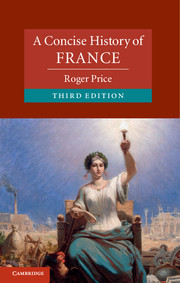Part I - Medieval and Early Modern France
Published online by Cambridge University Press: 05 June 2014
Summary
Introduction
The purpose of this section is to consider the making and evolution of the social and political systems that developed in France during the Middle Ages and early modern period until 1789 – the emergence of what German historians have labelled the Lehnstaat, or feudal monarchy, and of its successor Ständestaat, or state of the society of orders. This was a world ruled by kings and princes with a dominant aristocratic and noble social élite, and which, in spite of its burgeoning towns, remained overwhelmingly rural and agricultural. Power depended both upon wealth and the control of scarce resources, and especially access to land, and upon status, defined as a ‘social estimation of honour’ by the German sociologist Max Weber, and accorded in particular to the priests, who prayed for human salvation, and to the warriors, who defended society. These concepts, sanctified by the Church, legitimised social relationships and served to justify a complex of contemporary modes of social control. In the last resort, however, the ability to squeeze taxes, rents, feudal dues and tithes out of the population depended upon the use of armed force.
- Type
- Chapter
- Information
- A Concise History of France , pp. 13 - 14Publisher: Cambridge University PressPrint publication year: 2014

